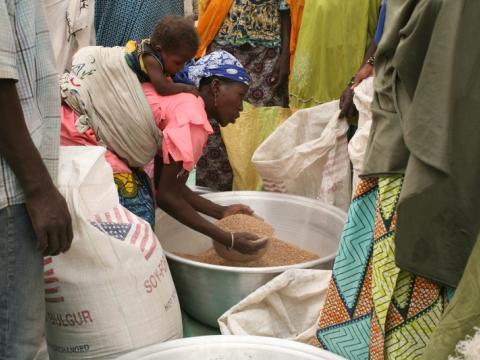World Vision Niger Works with Communities to Ensure Food Security

It is estimated that 2.5 million people in Niger are chronically food-insecure and unable to meet their basic food requirements even during years of average agricultural production. One in eight children never reaches the age of five and 42 percent of children are chronically malnourished.
As part of strengthening resilience, World Vision Niger made a strategic decision to include LAHIA (Livelihoods, Agriculture and health Intervention in Action) in their programs. LAHIA brings together the combine expertise and experience of the two partners in food security, health and agriculture programs in Maradi Region with the goal of food insecurity and malnutrition reduced among poor rural household.
Therefore, food for work project was established with an objective of recovering the farm lands that had been previously overgrown with cord folia SIDA, a highly invasive weed. These weed are one of the major threats to the natural environment, competing with native plants for space, nutrients and sunlight. And it does not allow the land to be productive. The project beneficiaries are vulnerable families, with children age 0 to 5 and lactating mothers.
Thus in the village of Rura, (approximately 10 km from Maradi), Aicha Saley a 30 years old mother of 5 children (3 girls and 2 boys) suffered to support her family. Her husband, Hamidou, use to support the family by doing small jobs but since he got ill 5 years ago, Aicha is the one supporting the family. She had to sell the little she had to treat the husband “I use to go to the farm and work before I get something to eat. It was very difficult, sometimes we use to eat once a day or go to bed with an empty stomach because of that my children lose weight and didn’t use to play like normal children, that made me concern. We use to spend the day or sleep in the bush to look for something to eat for our children. But today, with the project we receive food for the work we do. The work I do consist of lifting the weed so we can be able to use the land for farming and pasturing.” says Aicha looking happy.
According to Mamane Sani development rural facilitator, the area treated is 53 hectors and the beneficiaries work three (3) hours a day. The distribution of food is done in May to September because it is in that period that it is difficult for the vulnerable households to have enough to eat. By receiving the food it covers the lean season, because the harvest is not enough to eat all year round. The vulnerable communities that benefit from this project are chosen by a local authority committee comprises of local mayor, village chiefs and World Vision Niger staff.
Aicha said “with this project, I received beans, oil, wheat, CSB (corn soya blend with sugar) that enables me to feed my family 3 times a day. In addition to that my husband got a small job as a water seller in the village water point and he is paid at the end of the month, so with both our incomes we are able to meet the basic needs of the family. Today I can tell you that my children are well nourished, happy and they can play normally. It was through my last born, Nana (7month year old baby girl) that I benefited from the project, and I don't have to spend the day or sleep in the bush in search of what to eat. “Said Aicha hugging her daughter.
“I thank the donor for their help and I wish that other villages also benefit from this project” said Aicha clapping her hands.
LAHIA (Livelihood Agriculture and Health Intervention in Action) program with its various projects will continue to make sure that family like Aisha’s one are more food sufficient all year round.
By: Bakane Suzanne, Communications Intern